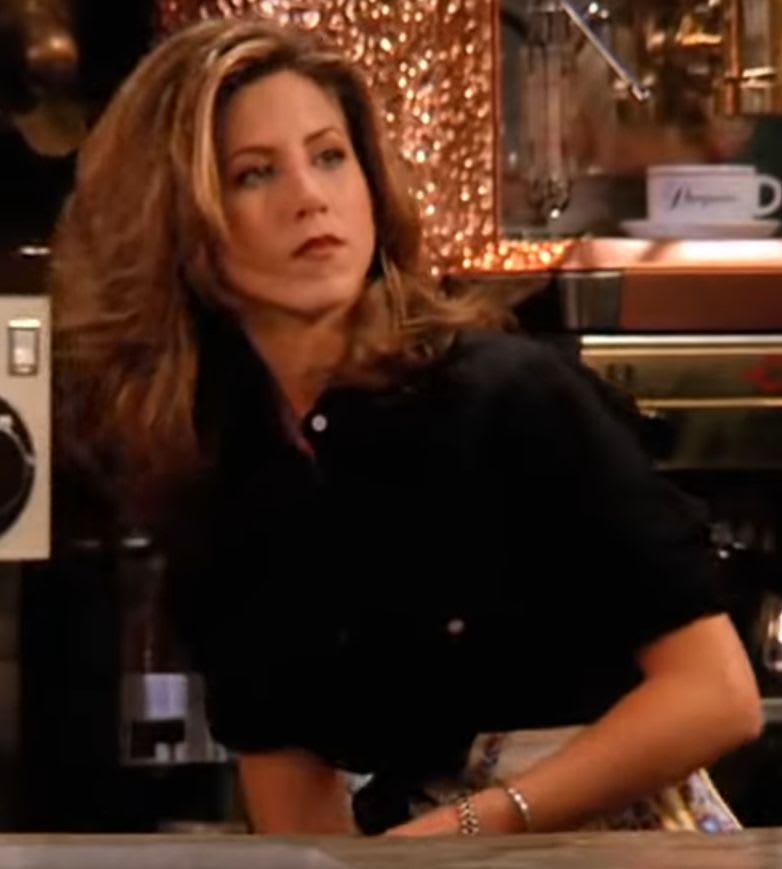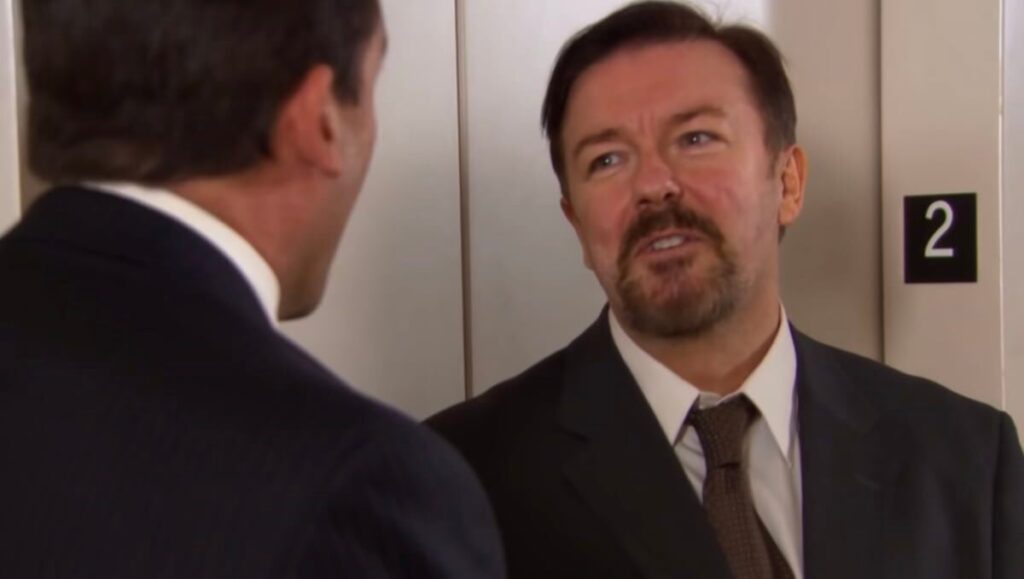“I can’t watch any sitcoms from before 2000 because they’re too ugly. Racism, sexism, rape and toxic behavior are not funny to me.
You may have heard a friend or family member say this.
Or you may have said so yourself.


Indeed, how do we end up watching old shows with so many problematic characters and politically incorrect plots?
Most iconic situation comedy characters are paranoid or two-faced and don’t try very hard to “become a better person.”
Gen Z might ask, “Why do TV viewers sympathize with so many terrible people like Archie Bunker, George Costanza, or Ross Geller?
Boomers might ask, “Why can’t we laugh at funny things anymore? In the old days, a good joke was a good joke.


While the culture war seems like the right answer, I blame what happened to situation comedies over the decades on the rise of “cringe humor.”
Grim humor is a subgenre of television comedy that emerged quietly in the early 2000s and has since become mainstream.
So mainstream, in fact, that we now view everything on comedy TV through a “cringe” or “virtue” lens.
If things are positive, we cheer. This is virtue, this is honesty, this is strength.
If something is morally or ethically negative, we boo. That’s cringe.
What is Cringe TV anyway?
This is the average person’s reaction to the elephant in the room – this old fool has no respect for the social fabric of our community.
He’s funny because he’s an idiot and we laugh at the awkward tension he brings.


How dare you? How dare we forget the times we live in and the new community standards that now dominate television?
One of our favorite social media expressions is, “You can never [that old show] today.
Of course not. That show from the 1970s or 1980s would offend so many people.
It’s not just humor from decades ago that doesn’t translate to today. That’s because we now see everything through a “cringe lens.”
We see an old joke from 30 years ago and we cringe and think, “Oh, that’s going to bother people, isn’t it?” or “Gee, that won’t sit well with today’s audience.”
Or my favorite slogan, “How did we think this was okay?”
What has actually happened is that over a hundred years comedy has evolved in both form and presentation.
Comedy changes over time because so much of it is based on our shared perspectives.
We find humor in situations we can all relate to. Essentially, we learn to speak the “language of comedy” with each other.
Laughter not only connects with your audience, it also finds something interesting from your perspective.


Nothing is universally interesting without context and an understanding of the audience’s shared perspective.
So when Millennials shrug and wonder “what were we thinking” during “I Love Lucy” or “All in the Family,” they are taking a trip to the museum the way TV viewers used to see the world.
No context is explained, but if you lived through that period you’d understand immediately.
The history of television comedy
“I Love Lucy” was one of the first classic situation comedies to air on television, a new medium in the 1950s.
There’s no blueprint for what a TV comedy should look like, or even a basic working formula.


Instead, the presenters took notes from the radio show, pioneering dialogue in television dramas and comedy.
Since there were no visuals, the joke had to be explained with words and voice inflections, like a vaudeville comedy routine.
Directors and screenwriters also take notes from films and stage plays that show them how to compose shots and how to set up the “mise-en-scene.”
So when you watch a sitcom today from 75 years ago, you’re witnessing the birth of a new genre, pioneered by Lucille Ball, director William Asher and others who created something new.
Sometime around the 1970s, people got tired of traditional situation comedies and mainstream movies.
Cinema gave us controversial films like Who’s Afraid of Virginia Woolf and A Clockwork Orange, so it wasn’t long before television began to come of age as well.


Situation comedies of the 1970s, such as All in the Family, Soap Opera, and Good Times, were known for mixing comedy and drama.
Situation comedies at the time were more like stage plays, as theater predates television by thousands of years.
While the best situation comedies are filmed in front of a live studio audience, the audience isn’t there just for the laughs.
Stage plays like “Our Town” and “A Streetcar Named Desire” elicited laughter, silence, screams and sighs, often followed by applause.
A variety of emotions are part of the live playing experience. Soliloquies and soliloquies were used much more frequently at that time because they were clearly a technique of live theater.
They cannot show a montage of scenes and convey feeling or knowledge immediately. You understood everything in the speech.
Grim comedy dominated the 2000s


It’s not cringe-worthy either.
Cringe, as we now understand it, does not exist. No one dresses up and goes to Cringe events. No one watches embarrassing reality footage every week.
Cringe later appeared in the 1990s, largely as a result of the creative decision to introduce a one-shot set and remove the laugh track.
Shows like “Beautiful Years,” “Fences,” “Northern Exposure,” “Pretty Woman” and “Sex and the City” have shown us that comedy doesn’t need laughs to make family audiences laugh.
While I have a soft spot for The Larry Sanders Show, which deconstructed our obsession with TV talk shows, let’s be honest, we have to give Ricky Gervais’s The Office credit for creating what we all know Well-known grim comedy genre.
Gervais and later American producer Greg Daniels taught us that making a modern situation comedy requires neither laughs nor traditional punchlines.


Gervais uses social awkwardness as a weapon, hitting the audience hard with scenes that are difficult to watch and elicit laughter.
We laugh as a defense mechanism against the social atrocities we are forced to watch.
Iconic figures such as David Brent and Michael Scott were seen as comic antagonists.
They are the “dumb” characters, the opposite of straight men, who are now pestering audiences to react.
Parallel to this golden age of embarrassing comedy, a new form of comedy was developing: reality television.
Reality shows are destroying the TV show model
Reality TV has no punchlines or special tricks—except to showcase the worst in human nature.


They’re unscripted (but still slightly manipulated in the editing) and embarrassingly candid.
We laugh, cringe, and scream at the screen as we meet these “real-life characters,” most of whom are antagonists, villains, and unlikable fools who are still inexplicably rich and famous.
Little did we know at the time that reality shows and awkward comedies were slowly shaping the future of comedy television.
These cringe-worthy shows go some way to teaching us the difference between right and wrong, or, we should at least say, the difference between being toxic and trying to be a better person.
The purpose of reality shows is to make us “hate” various real people because of their character flaws.


The cringe-worthy mockumentary teaches us what to do when we see something socially unacceptable. We passively resist this terrible thing.
We blush, cover our faces, stare in disbelief—sometimes even silently judging.
We might even stare into the camera to let everyone watching know, “This wasn’t my idea. I’m just as shocked as you are.”
Of course, it was funny at the time because it was so unorthodox compared to the clichés of ’90s sitcoms.
(Remember Seinfeld and all the Friends clones?)
But over time, we’ve allowed Awkward TV (the descendant of reality TV and comedy documentaries) to infiltrate the social consciousness of television comedy.
We no longer laugh together
Simply put, TV viewers don’t know how to respond to anything that isn’t an obvious punchline or an “embarrassing moment” straight out of a YouTube clip.


We have lost the ability to objectively analyze and discuss the provocative things we see on television. We have lost the desire to connect with each other and find common ground in comedic sensibilities.
We have downplayed our ability to disagree with someone or something, but still find value in having an open dialogue with our opponents.
Of course, you can blame politics for our differences as much as anything else.
But situation comedies of the past few decades seem to have seized on the opportunity to find humor in conflict.
Perhaps the problem now is that audiences are either polarized in their opinions or completely silent on any controversial topic.
There is no longer a sense of humor because we have stopped communicating with our enemies, rivals, and acquaintances who are not our best friends and therefore untrustworthy by default.
We’ve officially entered a new era of television’s politically correct comedy famine.
We can no longer handle conflict because we would rather fight than use humor to resolve an argument.


All we can do is cringe at anything that feels wrong and let the proverbial Michael Scott bully us into silence for the few minutes he rambles on.
All I can tell you is that if you’re feeling the effects of comedy hunger, watch some situation comedies from the 1950s, 1960s, 1970s, and 1980s.
See the world through the eyes of your parents or grandparents and try to find context.
Watching old comedies not only enhances your sense of humor but also helps you understand the neuroses of previous generations.
After all, knowing a person’s sense of humor is a peek into their soul.
TV fans, what do you think? Is this situation comedy bogged down by the rise of embarrassing humor and political correctness?
Hit the comments section below to share your thoughts!

